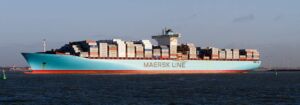News
Danish shipping could profit greatly by easing Iranian sanctions
This article is more than 10 years old.
Market could provide hundreds of thousands of kroner worth of golden export opportunities

“Iran may have the money, but Denmark has the skills,” says vice president of Dansk Industri (photo: Quistnix)
The Iranian market offers golden export opportunities for Danish shipping in the way of hundreds of thousands of kroner, assesses the Danish Shipowners Association.
This Tuesday is the official deadline for a binding agreement between Iran and the six world powers – the US, China, Russia, Britain, France and Germany – to limit Iran’s disputed nuclear program.
If negotiations go according to plan, it may result in the easing of the international community’s long-standing trade sanctions against Iran.
“There is potential for profits up to around 150 million kroner annually for Danish shipping companies,” Jakob Ullegård, the head of the Division of Policy and Analysis of the Danish Shipowners, told DR.
And according to the Danish Shipowners Association, an annual economic growth of 5 percent by 2020 is not entirely unrealistic.
Danish ships ready for oil cargo from Iran
There are a number of ways in which relaxed sanctions would benefit export opportunities for Denmark.
As well as oil exports, there is also money to be made from liquified natural gas exports.
“We have a Danish tanker fleet ready for docking to help the Iranians with the task,” Ullegård said.
In addition, a thriving Iranian economy has the ability to boost trade in goods and thereby increase the need for container freight, where Danish shipping is also strong.
Dansk Industri: Iran needs Danish competencies
Peter Thagesen, the vice president of Dansk Industri, asserts that Iran has historically always been one of the main export markets in the region for Danish industry.
However, in recent years, sanctions have made it one of the most difficult countries to do business in.
Thagesen hopes that an agreement on Iran’s nuclear program will change this.
“Iran may have the money, but we in the Danish business community have the skills that they greatly demand, like in areas such as green technologies, medical products and food,” Thagensen told DR .










































